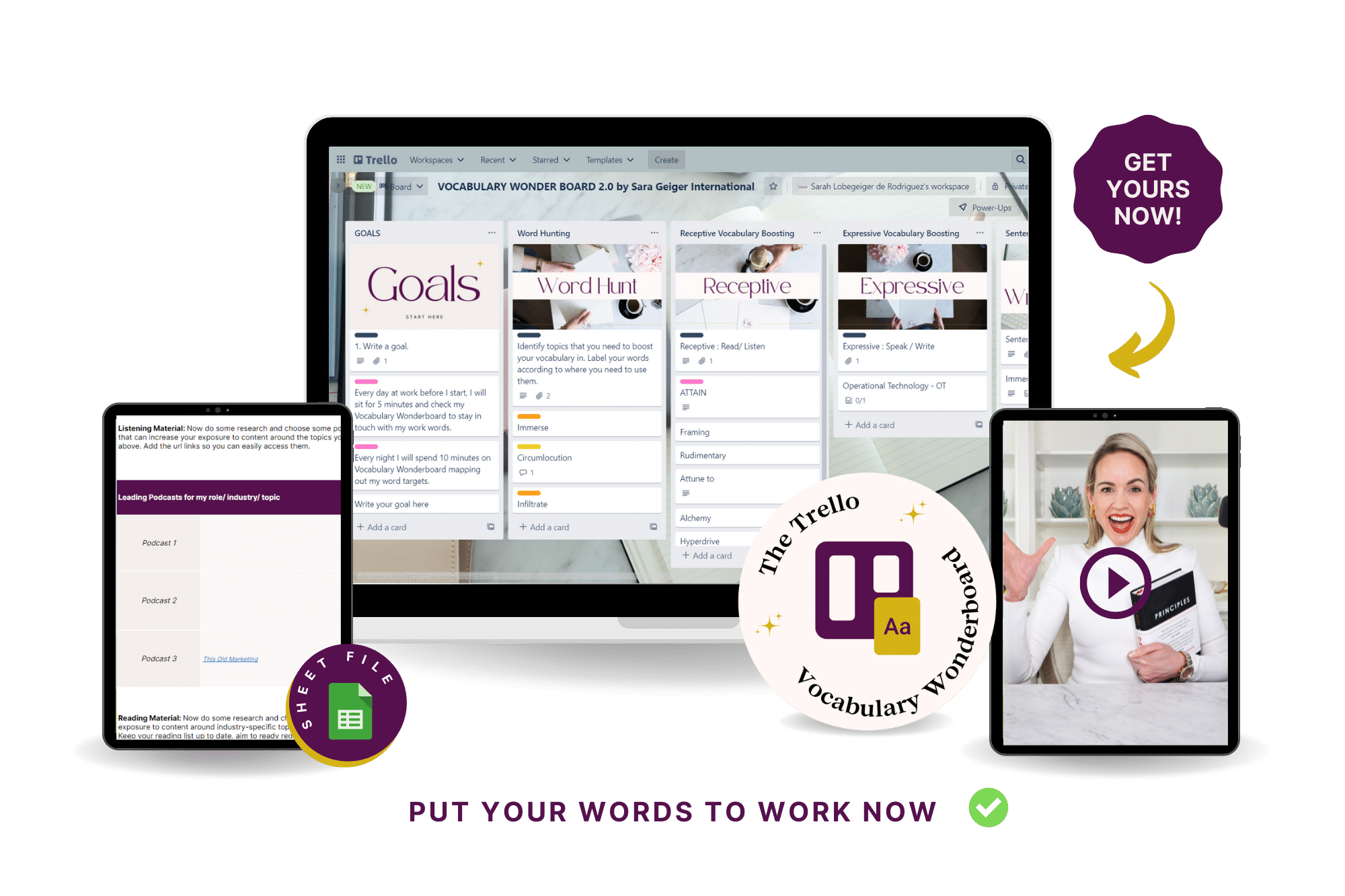Leadership Communication
How to sound Interesting at Work Without Using Cliche Corporate Buzzwords
Learn some tips on how to avoid using corporate buzzwords that are super cliché so that you can sound more interesting.

Anything said in the office repeatedly can get annoying, especially if you hear it daily. In this blog post, you’ll learn how to avoid using corporate buzzwords that are super cliche so that you can sound more distinctive. We’ll also cover why corporate buzzwords are verbal vomit and how they plummet your impact and make your language sound cliche.
Suppose you want to show up as an industry leader? In that case, I have executive presence tips that will help you bolster your vocabulary so that you communicate at an elite level that builds rapport and trust in your expertise. Keep reading for some vocabulary strengthening ideas.
This blog post is best digested in 3 parts:
- Check the tips below.
- Watch the vlog for more detailed training.
- If you want to learn how to work on your communication for only 5 minutes a day using a system that gets real results, our Vocabulary Workshop is for you. It will help you execute a system that gives you the words you need to show up with the professional expertise you’re qualified for.
In 2022, the website Preply rated and surveyed 1500 people to discover the most hated corporate buzzwords, and I will share 10 of them with you. As an executive speaking consultant, I can’t help but contribute and say my piece on this most hated topic of jargon. I’ll be sharing some more words you can think about removing.
Here are the most despised corporate buzzwords, according to Preply.
#1 New Normal
Word number one is the new normal. This gives horror memories for most people of what we had before “…” – let’s move to the next word because I don’t want to spend too much time reminding you.
#2 Culture (e.g company culture)
Here, the word “culture” is applied in terms of “company culture.” You may have heard people say something is “not in their company culture” or that their “company culture is extraordinary.” I don’t know about you, but hearing that phrase makes me doubt whether it’s an organization that I want to engage or work with.
#3 Circle back
“Circle back” is a phrase that probably tops the list of most people’s hated corporate buzzwords. Since it’s easier to say “get in touch,” or “contact you” how about we stick with that?
#4 Boots on the ground
Since when do we go to the office and sit with our boots off the ground? This phrase doesn’t make much sense, and we should get rid of it.
#5 Give 110%
Bordering on demanding toxic overworking, this term definitely needs to be extinct!
#6 Low-hanging fruit
Another corporate buzzword that most people find irksome is “low-hanging fruit.” If you’re an entrepreneur, watch out for this one. A lot of people in the consulting industry are using this when they’re discussing marketing. Unfortunately, it’s overdone, and it’s tiring. So let’s find some new metaphors to keep people engaged.
#7 Win-win
Most people use “win-win situation” to express unclear benefits to their employees. Employees are drowning and overworked in win-win situations. Why not state the specific benefit if you want to engage your team and tell them there’s a benefit? Refrain from resorting to this jargon-like phrase. Don’t tell everyone it’s a “win-win” when it’s probably just increasing effort for your team members. They’re not thinking deeply about what benefit might be in it for them. It’s better to map out a rapport-building phrase that’s direct, explicit, and honest to prove that there is a benefit for both sides.
#8 Move the needle
The next one is to “move the needle.” We are not sewing. It’s 2022. I don’t know if I even own a needle. Moving the needle in your business, moving the needle in your marketing, moving the needle in your team culture. It’s so cliche. Let’s drop it.
#9 Growth hacking
“Growth hacking” makes me think of growth hormones. It’s overused. Let’s not hack growth. Let’s find a concrete, human and authentic way to communicate rather than resorting to hacking.
#10 Think outside the box
Thinking outside the box is also pretty cliche. There are other ways to simplify it, like “be creative”, but “think outside the box” is overused.
Now, as you can see, these words trigger me. So I also wanted to keep going. So I’ve added the top 10 that irritate me.

Top 9 Corporate Buzzwords that might Make your Colleague’s Ears Bleed
#1 Lean in
It requires more context. It makes you question things like, “should you lean on something?” Lean into what? We have to be specific.
#2 Temperature check
If you’re asking this question in a meeting, that’s a vital sign that the meeting could have been an email, or it probably shouldn’t have happened. Please don’t ask people what their temperature is when you get the vibe that they aren’t listening and engaging with you. Think about cutting and or cancelling that redundant meeting.
#3 I’ve got no bandwith
The next one I don’t enjoy is “I’ve got no bandwidth” because it makes me think someone has told me some World War II morse code. It’s also a bit toxic. It’s suggesting to your listener that you’ve got no headspace for them. You might feel that way, but let’s be more socially intelligent. Let’s find a way to tell them we’re overwhelmed instead of using a cliche phrase. It shows a lack of effort and action.
#4 Reaching out
I am working on removing these corporate buzzwords myself. It’s straightforward to open an email with, “I’m reaching out to check if you saw my email” but there are other ways to express this.
#5 Just checking in
“Just checking in to fly somewhere in this email, heading to Monte Carlo in the plane via email to check in on where you’re at with the project brief.” Let’s get rid of that one, too.
You might like to check these helpful guides:
- Stop Forgetting Words: How to face Word Finding Difficulty Confidently – read more here
- Stop Stumbling over Words: Workplace Communication Strategies – read more here
- Success Starts with Word Power – read more
#6 Your journey
“Your journey” is my most hated corporate buzzword. It’s so cliche. In my area of work as an entrepreneur and product developer for communication services, I read research where this phrase used to have relevance. We see theories around customer experience and their journey. Unfortunately, the phrase is heavily saturated with opinion-based consulting, life coaching and other usage areas. Let’s keep journeys for an actual mountain trek or climbing Everest and keep it out of the office.
#7 From an x perspective
I hear “From an (insert your job position) perspective,” often in the clinical space, and it’s a phrase that’s used to level up above the listener, especially if the listener isn’t from your field of expertise, the scope of practice, or discipline.
It’s elitist. It’s an unnatural way of communicating. It’s also often a red flag for one-upmanship, where the speaker says, “By the way, in case you didn’t know, I’m a fully qualified expert in this field.”
#8 It is what it is
I know many people who use “It is what it is.” Let’s think logically about what that means. It means nothing. It’s the most redundant phrase that you should get rid of.
#9 Let’s recap
Instead of “let’s recap,” how about we concretely state a summary with innovative and exciting words, so we end our message with pizzazz, which will make it more memorable?

Why do we use corporate buzzwords?
Corporate buzzwords tend to arise when a thought leader or someone innovative in the office drops a nifty phrase, and suddenly, the office’s culture starts to adopt it.
They find it cool and attention-grabbing. But before you know it, the new word or phrase emerges everywhere. It gets overused in headlines and marketing, consulting and coaching environments. People then use it in mission statements.
Eventually, the word or phrase gets overused and watered down. It has no meaning and no hook point for the listener anymore. It starts to get as redundant as words “like, and, uhmm, the thing is,” these filler phrases.
We are heavily influenced by the people around us and the things we hear. This is because the mirror neurons in your brain are firing and replicating behaviours, emotions, and expressions. Then it assimilates what you hear and what you see. So it’s important to be mindful and screen the words you hear around you. Just because everyone else is using them doesn’t mean you should. Corporate buzzwords don’t give you that niche advantage or the impact and influence that backs up your expertise- they drown you out.
Five Strategies to Stop Using Corporate Buzzwords
#1 Work actively on increasing your vocabulary.
Corporate buzzwords tend to fall into place when we need specific concrete words to replace them. So you have to be actively working on your vocabulary. Read more books, articles, and research. Listen to podcasts as well. Please take note of words you don’t understand so you can look them up later.
#2 Monitor your colleagues, employees, clients, and stakeholders’ vocabulary.
What are your colleagues, employees, clients, stakeholders, and even family members saying? Be mindful that you don’t mirror the bad vocabulary, the neutral repetitive phrases, or cliche jargon you hear.
You have to focus instead on using plain, concrete English. Build rapport with your listener, especially if your listener comes from a different field or scope of expertise. Focus on talking like a human, not a robot or a textbook.
#3 Work on using plain English.
Your message will increase in value if you keep it clear, precise and jargon freee.
#4 Think about increasing your word variety.
The next strategy is to think about increasing your word variety. Find new ways to say things. Keep it conversational because that will be a lot more warm and open for anyone tuning into what you have to say or reading your emails.
#5 Speak as an expert but be authentic.
When you communicate, you may feel all sorts of pressure to demonstrate expertise and credibility. You have to strive to be who you are. Work on your vocabulary on the side and be careful not to one-up yourself or stand out as better than your listener. Meet your listener where they’re at.
So working on your vocabulary is one of the key areas that can expand the words you have at your disposal. I know many people need help with how to build their vocabulary. However, there is actual research and science behind developing your vocabulary as an adult, regardless of your first language.
Personal development is only sometimes necessary at every single step of your career. However, if your communication needs some improvement, keep the strategies I’ve shared with you today.

Get Access To
The Vocabulary Workshop

Our online, on demand Vocabulary Workshop will help you find the right words and finally solve your word-finding problems at work.
The vocabulary wonderboard program uses science-based methods and trains you in a decisive step-by-step system to strengthen memory networks for new words that gets you using them.
Did you enjoy this post? Make sure to subscribe to our YouTube channel to get more content to increase your communication skills!
About the Author
Dr Sarah Lobegeiger de Rodriguez is a Keynote Speaker, Executive Speaking Coach, and Opera Singer who likes to play with words, sounds, and your impact.
Her academic background is in Music Performance, Communication Science and Speech & Language Pathology. She assists executive communication clients all over the world as a communication consultant with strong expertise in CEO, Founder and Entrepreneur communication strategies.
Connect with Sarah on LinkedIn.
© CADENZA
Level 14, 380 St Kilda Road, Melbourne, 3004
Privacy Policy
Terms & Conditions
Position Statement on Racism

